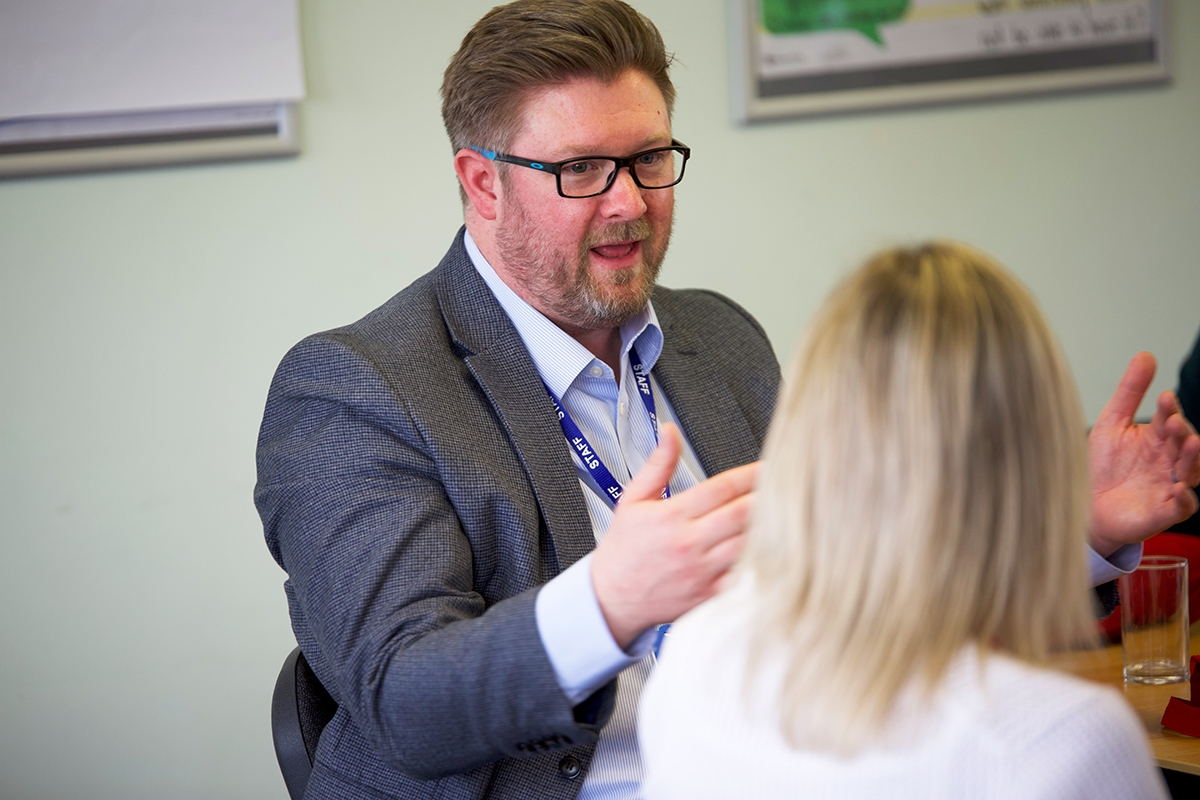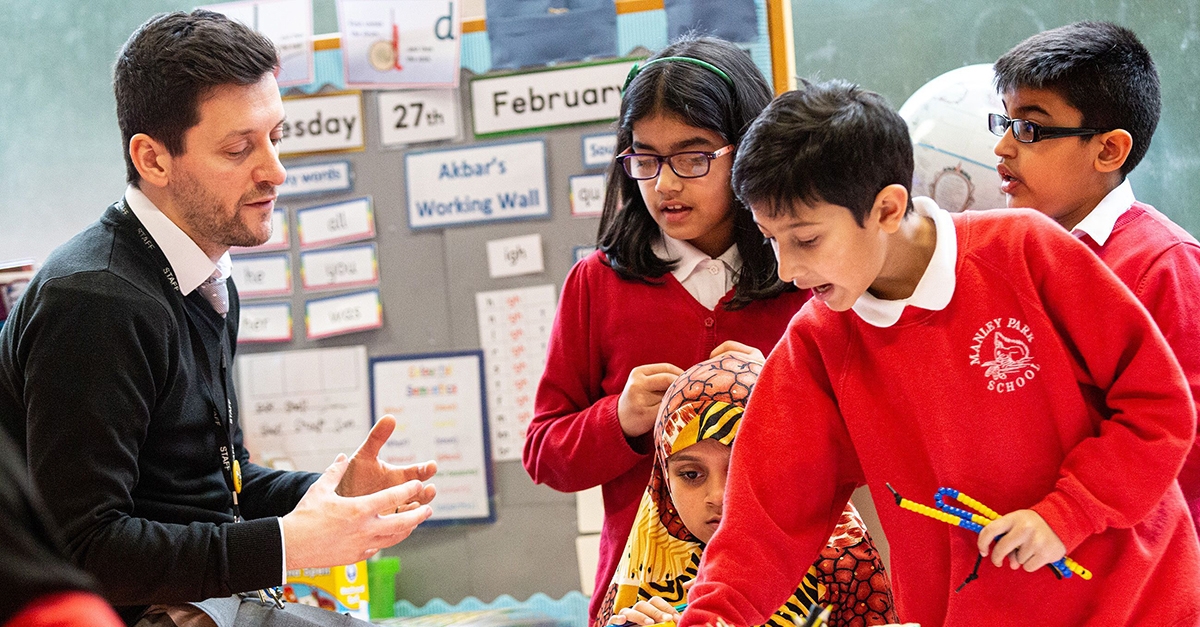Introducing the Qualification Programme for Teachers: Our most ambitious project yet
I love the fact that our qualification programme adheres so closely to our core value of becoming better teachers so that children can become better mathematicians.
At Maths — No Problem! we’ve reached an inflection point.
After years of refining our materials and helping thousands of children become more confident mathematicians, the time has come for us to launch our most ambitious community project ever.
And so we are proud to introduce Maths — No Problem! Qualifications for Teachers. This programme is designed to broaden the impact of our problem-solving approach and take the guesswork out of CPD by providing a clear and coherent pathway to maths mastery expertise for teachers.
The programme consists of three levels of qualification — Fellow Teacher, Expert Teacher, and Master Teacher — as well as a Licensed Trainer designation.
Recently, CEO Andy Psarianos sat down with Adam Gifford, our Head of Product who is leading the development and implementation of the qualification programme, to chat about how it works and why we’re both so excited about it.
What follows is an excerpt from their conversation:
Andy: We’ve been talking a lot to our Accredited Schools and others in our community about Qualifications for Teachers, and people are excited about it, but for those who haven’t heard about the programme yet, how would you describe it?
Adam: With the Qualifications for Teachers, we want to provide a really clear and coherent process and structure that can be trusted so the professional development path of teachers continues. We're trying to take the guesswork out of developing professionally, so we’ve crafted a programme that says ‘here's your starting point,’ and all the way through there’s a rationale for why we recommend this pathway.
Andy: Why is the programme important?
Adam: Because in the UK, we don't have many qualifications. You can get a PGC or a postgraduate diploma in teaching or you can get a teaching degree. And then you start teaching. But after that, we don't really have qualifications. We have titles within schools. We might be a maths lead or a phase lead. So we're recognized through the senior leadership structure, but titles aren’t qualifications.
There are some mathematics qualifications that are more like acknowledgements or accreditations. But they’re few and far between.
The qualifications really start to happen at the NPQ — the National Professional Qualification — level. There’s one for senior leaders, there’s one coming for mathematics. But outside of these, there are very few actual qualifications that relate to our teaching practice.
Andy: What about a master's degree? That’s a kind of qualification, right?
Adam: Sure, you can go and do a master's, but that's something you opt into. That's not necessarily based on your classroom practice. Our qualifications identify a sound pedagogical approach to teaching mathematics. They identify that a recognised set of expectations will be met. And they recognise the ability to take the approaches that we promote.
Andy: In other words, our qualifications guarantee that your classroom practice will be recognised at a glance as being pedagogically sound.
Adam: Precisely. You can teach using a mastery approach and it’s recognised no matter where you go. It’s not specific to the school. If you want someone who can deliver a mastery lesson, I’m your person. You want someone who can develop core competencies? I’m your person. And it’s not just me saying that. Here’s my qualification.
Andy: Is it fair to say it’s also about developing confidence and skill as a teacher of mastery mathematics?
Adam: Absolutely. You've got these milestones at each point. And along with the steady building of expertise, you’re steadily building confidence and skills.
Andy: You mentioned there’s a coherence to the programme. What do you mean by that?
Adam: We're not trying to just pick certain things out and say ‘if you do this, you might just know about this one thing.’ We're saying each of these is a step towards reaching levels of expertise to broaden and widen the impact of the teacher’s expertise.
Andy: What’s the promise we’re trying to make to people with this programme?
Adam: The promise is that we've crafted something in the same way we've done with the textbooks, where the steps to expertise are really well thought out. They’re in keeping with progression and building on what's come before. And that we’ll continue to evaluate the community to make sure that we meet the needs of the community.
Transform Your Maths Assessment
Insights — our online assessment tool — gives you instant, powerful data to identify gaps and improve results.

Andy: So for people who haven’t heard about this programme, tell them what the first step to getting qualified is.
Adam: It starts with the three-day Essentials course. That ultimately gives us the understanding of how we teach mathematics in our classroom. That's what the Essentials course is for — to be confident in teaching and using a mastery approach when teaching mathematics.
Andy: In other words, an approach that's pedagogically sound and well-researched.
Adam: Exactly. We've got to understand the pedagogical approach to teaching mathematics, and it starts in the classroom. That means being able to understand the various parts of the lesson, the language around the lesson, and all the essentials to make sure that what's going on in your classroom is sound.
Andy: That makes sense. We’ve got to get it right in the classroom.
Adam: We lay the foundations in the classroom. That's what we do in the Essentials course.
Andy: What happens after you've taken the Essentials course?
Adam: You'll come out of the Essentials course with 18 credits, and that’s the prerequisite for becoming a Maths — No Problem! Fellow.
Andy: So just to repeat that for people, when you complete the three-day Essentials course, you will automatically have enough credits to become a qualified Maths — No Problem! Fellow?
Adam: That's right, Andy.
Andy: What comes after that?
Adam: The next step along the pathway is the Expert Teacher qualification.
Andy: How do I qualify to become an Expert Teacher?
Adam: To qualify as a Maths — No Problem! Expert Teacher, you need a minimum of 36 credits.
Andy: How do I get those?
Adam: You would complete further qualification courses — we recommend whole numbers, fractions, and geometry since these topics form the majority of the curriculum — to build core curriculum support.
Adam: A one-day qualification course is worth six credits. So with the Essentials course, which is worth 18 credits, and three one-day qualification courses under your belt, you’ve met the credit requirements for becoming an Expert Teacher.
Andy: What else is involved?
Adam: The pathway is crafted to ensure that you begin to build on the foundations you've laid by attending the Essentials course. You start to develop specialisms in certain areas so that you can support colleagues and know what to look for when you're making strategic decisions. You begin to understand how you can influence decisions across schools or several schools, as in a trust.
Expert Teachers mentor peers and they share advanced strategies and best practices. To qualify, you’ll need to be able to showcase this through a professional portfolio, which will demonstrate your contributions to improving maths education within your educational setting and your ability to reflect on change management and implementation.
Andy: A professional portfolio sounds a little intimidating.
Adam: It’s not. When you get to a point where you know you can teach specific areas of the curriculum well in your own classroom, you might think, ‘Now, I'd like to develop the content knowledge to be able to support colleagues.’ If you use that in such a way that you're supporting colleagues because you've got the skill set to do so, and you can evidence the fact that you are using this to support colleagues, you will be eligible for the expert qualification.
Andy: Great, what’s next?
Adam: Our final qualification level is the Master Teacher. To qualify as a Master Teacher, you need a minimum of 48 credits. That means getting 12 additional credits from advanced qualification courses, like Assessment, Journalling, and Bar Modelling.
Andy: So let me get this straight. You need 18 credits to become a Fellow Teacher, another 18 to become an Expert Teacher, and another 12 to become a Master Teacher.
Adam: That’s right.
Andy: Is there anything else I need to do?
Adam: Master Teachers must be able to demonstrate that they’ve made a significant impact in their community and that they actively support maths programmes in the broader professional community. Master Teachers implement change effectively and know how to support organisations to manage change.

Dr Jeremy Hannay, Headteacher of Three Bridges Primary and Maths — No Problem! Master Teacher.
They share their expertise and help other people develop their expertise, so it means that in the classroom, we've got teachers who are doing a good job and our children are learning maths well.
We're also seeking to develop strategic thinking, so there's a leadership aspect to this and there's a pathway through to strategic and leadership levels that allow for a greater impact on maths programmes in the community.
Andy: Is there a portfolio involved?
Adam: Yes, just like with the Expert Teacher, the impact of Master Teachers is showcased through the professional portfolio.
Andy: What about fees?
Adam: There is no fee to become a Fellow Teacher when completing the 3-day Essential course with a Maths — No Problem! trainer. The administrative fee for both the Expert Teacher and the Master Teacher is 150 pounds because we have to evaluate the portfolios.
Andy: How long would it take me to go all the way through and get the three qualifications?
Adam: This is an entire program for professional development over a number of years, it's multifaceted and it really does what it says. We recommend that after you take the three-day Essentials course, you get at least six months of classroom practice to make sure you have a solid grasp of the fundamentals. Then within a 12-month window, look at completing the qualification courses to become an Expert Teacher. Becoming a Master Teacher may take a little longer.
Andy: Do I automatically become a Licensed Trainer after I have qualified as a Master Teacher?
Adam: Once you reach the level of Master Teacher, you have the opportunity to apply to become a Licensed Trainer. This acknowledges the level of expertise required to become a Master Teacher and is a way of saying, ‘You’re good enough to deliver training for us.’ A Licensed Trainer builds on the Master Teacher level to train others in the Maths — No Problem! approach both within your school and the larger maths community. You would also serve as an ambassador for the Maths — No Problem! Programme.
Andy: I love the fact that our qualification programme adheres so closely to our core value of becoming better teachers so that children can become better mathematicians.
Adam: That’s a really important point that shouldn’t get lost in all this. The reason why we’re doing this is to support as many children as possible to be able to learn mathematics really well and give them a huge life chance.
Andy: How do people learn more?
Adam: They can visit our Qualification Programme for Teachers page.

